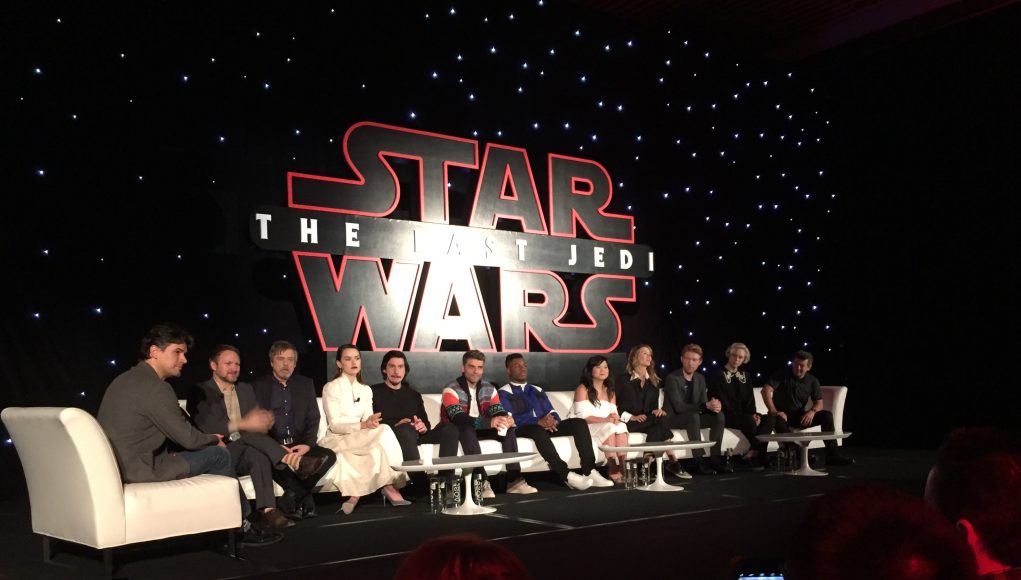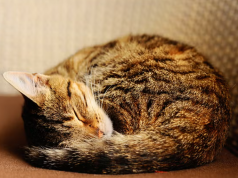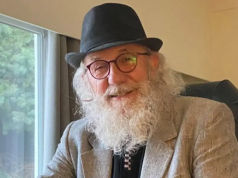Star Wars: The Last Jedi Q&A with Rian Johnson, Mark Hamill, Daisy Ridley, Oscar Isaac, Adam Driver, John Boyega, Kelly Marie Tran, Laura Dern, Gwendoline Christie and Andy Serkis
There won’t be a bigger movie released this year than Star Wars: The Last Jedi and Gonzo was there at the cast and director Rian Johnson’s press conference for the film. We even got to ask a question, but Mark Hamill dodged it in a way that would make Yoda proud.
Hamill, Johnson, The Force Awaken stars Daisy Ridley, Oscar Isaac, Adam Driver, John Boyega, Gwendoline Christi and Andy Serkis were there with new cast members Kelly Marie Tran and Laura Dern. The Last Jedi opens everywhere Friday, December 15.
G: If Luke is training Rey, he’s sort of in the position Yoda was in in The Empire Strikes Back. Is it like your parents say, “You’ll understand when you’re older?” Does he finally learn some of Yoda’s lessons now that he’s the teacher?
MH: Well, you’re assuming that I’m training Rey.
RJ: Sneaky.
MH: I have to be really careful. People say, “Was it difficult to pick up and wield a lightsaber.” And I go, “Do I?”
RJ: Is it difficult acting in this movie? Am I in this movie?
MH: I can promise you my part is twice as big as it was.
Q: What differentiates The Last Jedi from The Force Awakens and also Empire Strikes Back, the second chapter of that trilogy?
RJ: Well, yeah, it’s the second movie in a trilogy and I think we’ve been kind of trained to expect it will be a little darker and obviously it looks a little darker. The idea though is for me, I loved the tone of the original films and also that J.J. [Abrams] had captured in The Force Awakens of fun. To me, it’s a Star Wars movie. First and foremost, we were trying to make it feel like a Star Wars movie. Then to have the intensity and you’ve got the opera, but it also means that it makes you come out of the theater wanting to run in your backyard, grab your spaceship toys and make them fly around. That’s a key ingredient to it. So we’re going to go to some intense places in the movie but I hope also it’s fun, it’s funny.
Q: Rian, you said a lot of visual cues for The Last Jedi were taken from The Empire Strikes Back? What spoke to you about Empire and what shot did you really want to replicate?
RJ: Well, my cinematographer, Steve Yedlin who I’ve been best friends with since I was 18-years-old, we met in film school. To be standing next to each other on a Star Wars set was pretty surreal. I think Empire is just the most beautiful. All the films are beautiful but for my taste, I think the cinematography in Empire is the most gorgeous of the whole series. So Steve and I looked at the lighting in that. It’s also pretty daring in terms of how dark they were willing to go, literally dark, and how gorgeous they went with some of the choices and the shading of the lighting. Then in terms of an actual visual aesthetic, I made a choice very early on that I thought, “Well, I can either try and copy my idea of what the original movies did which is much more of a formal, the camera didn’t move a ton, it was a much more formal visual aesthetic.” Or I realized we’re going to take visual cues lighting-wise and design-wise from the previous movies, but I need to just shoot this movie the way that I would shoot a movie because at the end of the day, if I’m not engaged with it and I’m not trying to tell the story the way that really makes me excited, then it’s not going to be up there on the screen. I cut myself loose camera movement-wise and shot-wise from trying to imitate the past and just tried to tell the story as excitingly as I could up on the screen.
Q: Will there be any Ewoks in The Last Jedi?
RJ: Depends what drugs you take before you go in.
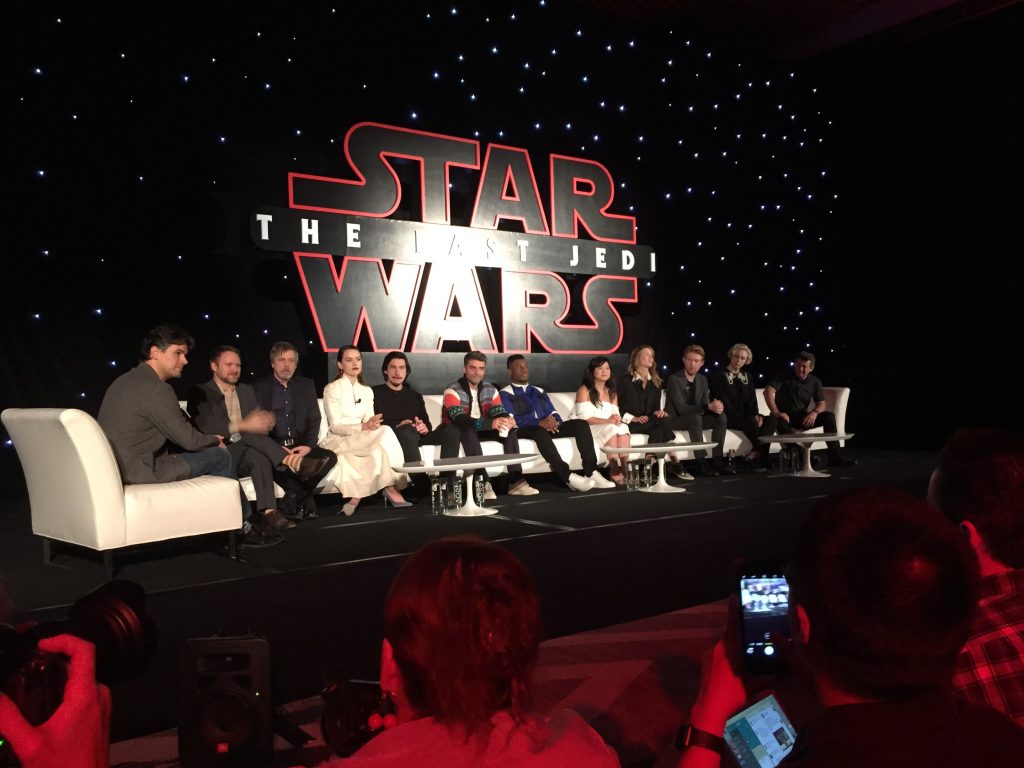
Q: There are so many more women in The Last Jedi. That’s going to mean a lot to little girls. What does it mean to you to be that?
DR: Growing up in London, obviously I knew there was a disparity in films but I wasn’t so aware of, growing up in a liberal household, I was never really made to go any one way. When I got involved, I knew it was a big deal but the response was so beyond anything I could’ve imagined that it was only after that I was like oh, oh yeah. It’s not like I ever took it for granted or anything but it was just so monumental, the response and how people felt about it. Obviously, that’s a testament to Kathy [Kennedy], J.J, Michael [Arndt] and Larry [Kasdan] who created the character from the beginning. I think what’s great about everyone is it’s not like she’s a girl, this is a guy. Everyone is just great characters but happily falling into broader categories now. I am thrilled.
KMT: Yeah, I agree. It feels like both an honor and a responsibility at the same time. I feel like from the beginning, when I initially found out I got this role, I just felt like I wanted to do the whole thing justice. The girls in this movie kick some butt. Every single one is so good. I can’t wait for everyone to see it.
LD: I just want to pay tribute to Rian for being one of the most brilliantly subversive filmmakers I’ve ever been able to bear witness to. In the case of the look of my character, I was moved by the fact that he really wanted her strength to first lead with a very deep femininity. To see a powerful female character also be feminine is something that moved away from stereotypes that sometimes perceived strong female characters must be like the boys. I thought that was a really interesting choice
GC: I was so delighted. I wasn’t cast in the first Star Wars film yet when I heard about the casting. I was utterly delighted to see that there was a more representative selection of actors that were going to be in these incredible Star Wars films and that has continued. Everything that my amazing colleagues say is absolutely right. You get to see women that are not being strong just because they’re acting like men. They’re doing something else and also you’ll see a developed character, or at least a developed human character that’s showing some complex character traits. I’m just delighted about that and I’m delighted that something as legendary as Star Wars has decided to be modern and to reflect our society more as it is.
OI: As a guy, I’d like to say that for me, the most formative people in my life have been women. So that has shaped my destiny so much. To see that reflected in the film is really a beautiful thing and it is important to reflect what’s happening out there, what’s always happened. They’re the ones that shape you.
AS: Speaking as the leader of The First Order I can say that Snoke is very unimpressed by the fact that there is such a huge female force that seems to be growing in number. It’s threatening, it’s deeply undermining. It’s got to be stopped. It cannot go on.
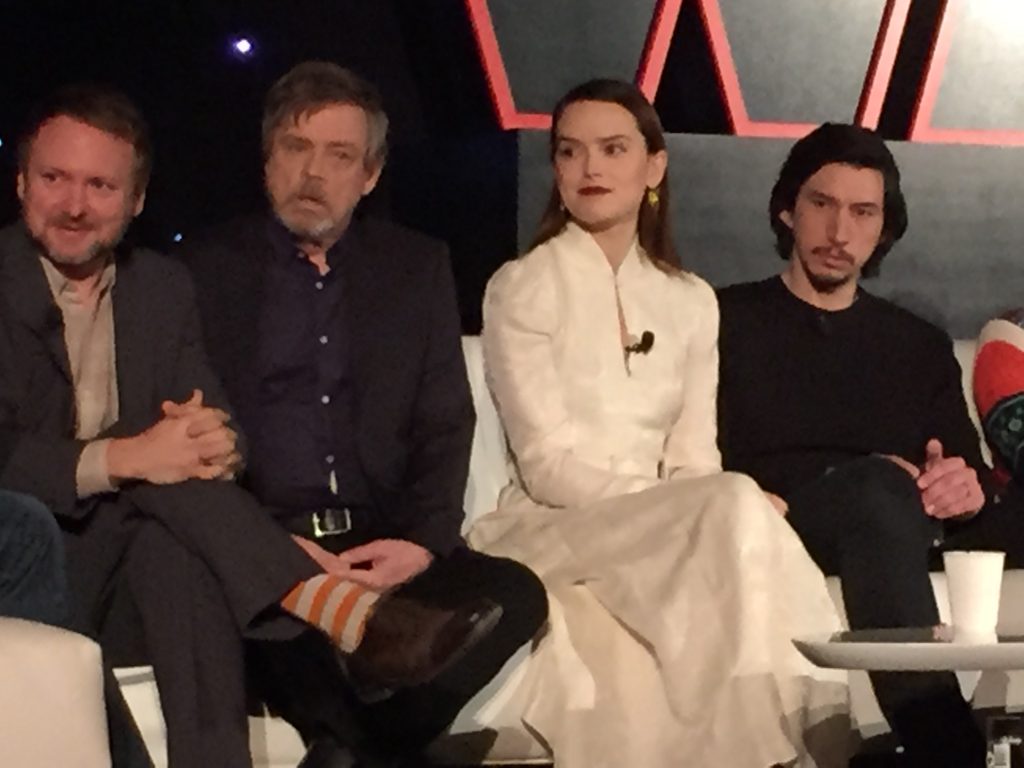
Q: On The Force Awakens, you had Carrie Fisher, Harrison Ford and Mark Hamill to lead the way. Now you’re leading the way for more new characters. Did that put some onus or responsibility on you?
AD: No. I don’t think so. The lesson that I learned from the first one from Mark, Carrie and Harrison, and other people that I worked with, is not telling you what your experience is going to be because we’re all different and we see the world differently. That’s kind of an obvious thing but kind of similar to the question from before. It’s hard to impose an idea on someone that you don’t know. I think everyone’s relationship, certainly within them, I would imagine is different. That’s for them to discover. It’s almost more generous to give someone space to make it personal to them. I’m not really sure what that means. They weren’t kind of, “Let me tell you what it’s going to be like” because no one really knows. I think they would say, for them coming back to this movie, after so many years that I think maybe Mark could speak better to this, that even they have to figure out what it means to them. I think they’re lead by example people. That’s kind of what I’m avoiding saying because it’s so cliche. It’s more powerful when you see it in action. I think none of us took it upon ourselves to tell people how it was going to be for them because we’re not them. I don’t think it affected our performance in any way. I think everyone was equally terrified to figure out what we were doing. Sure, we were looking at space.
Q: George Lucas made the original trilogy through the droids’ eyes. Does that continue through BB-8 and BB-9E?
RJ: It’s different. It was different in The Force Awakens. It’s different in this also. We don’t quite have so much the Hidden Fortress kind of worm’s eye view of the story that we started with in those movies. With this, different story, had different needs so we are much more with our leads the whole time.
DR: I’ll just quickly add what I think is amazing about the film is that every character, I don’t have a big film knowledge so I never understood the structure of what Star Wars was and what anyone was trying to fulfill because it’s me watching it. I think you really follow the story because you’re with every character. Everything you need to see is happening on screen. You’re not seeing things that have happened off screen. So people are asking the questions on screen, they’re getting answers on screen, they’re having their adventure on screen so you’re with everyone every step of the way. The story is unfolding and I think it makes for compassionate viewing because you’re really understanding both sides, why people are doing the things they’re doing and how it’s being fed from everywhere and how things collide and the consequences of those people’s actions, how they directly affect other people.
Q: What do you hope people learn from The Last Jedi?
AD: Again, it’s a personal thing. For probably some, there will be nothing. The best way I understand how seeing the film will be in a dark room with people who are total strangers works. Whether that be a play or a movie, no one lives in the theater. Everyone has lives outside. There’s a kind of collective intelligence that happens in the room and what is rewarding about it is realizing that you all are having a different experience but at the same time the same experience. Whatever your life is outside, whatever circumstances, whether it be death or drugs or birthdays, you bring it to the theater. Whatever is happening in the movie, obviously where you are in your life, I think, speaks to you in a different way than anybody else. So it’s a hard thing to blanketly say, “I think you’ll feel this.” because again, we’re not you. Maybe potentially nothing.
Q: Is the perils of meeting your hero a theme?
RJ: I think these movies to some extent are always about, to really boil it down, if you look back at Lucas famous’y drawing from The Hero’s Journey, Joseph Campbell wrote about. The Hero’s Journey is not about becoming a hero, it’s not about becoming Hercules. It’s about really adolescence. It’s about the transition from childhood into adulthood and finding your place in the world. You have these new powers that you’re feeling inside yourself for the first time. You don’t know what to do with them. You don’t know who you’re going to get help from and who’s going to be unreliable. IT’s about navigating those very tricky waters that we all have to navigate. That’s why it’s so universal. Part of that is your relationship to heroes and people you thought were your heroes, people you don’t expect to become your heroes. That’s definitely something that plays out in this film.
MH: I don’t think a line in the script epitomized my reaction more than, “This is not going to go the way you think.” Rian pushed me out of my comfort zone as if I weren’t as intimidated and terrified to begin with, but I’m grateful because you have to trust someone and he was the only Obi Wan available to me. Not only in my choices as an actor but my choices in sockwear. I was so embarrassed. I looked at my drab, black socks and I said, “Curse you, Rian. I’ll get my revenge.”


